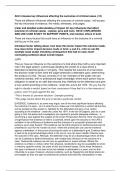AC2.4 Assess key influences affecting the outcomes of criminal cases. (10)
There are different influences affecting the outcomes of criminal cases. I will access
the key influences of evidence, the media, witnesses, and judges.
(clear and detailed understanding of impact for key influences that affect
outcome of criminal cases) - assess; pros and cons. HAVE 4 INFLUENCES
AND USE CASE STUDY TO SUPPORT POINTS, and mention others in brief.
There are many factors that could have an influence on the outcome of a criminal
trial by jury in the court.
Introduce factor talking about, how does this factor impact the outcome made,
how does factor impact decision made in brief, a and d’s, refer to real-life
example (case study) including consequence this had on case, short
concluding sentence about overall impact.
JURY
The jury have an influence on the outcome of a trial where they fulfil a very important
role in the legal system; unanimously deciding the verdict of a case where a
defendant is deemed guilty or not guilty. This impacts the outcome of a trial where
the decision made is then what the judge sentences a defendant upon, determining
the product of a trial. The jury consists of 12 ‘lay’ members of the public who are
randomly elected, with no professional legal knowledge, where each person has an
obligation to swear by an oath that ensures they ‘faithfully try the defendant and give
a true verdict according to the evidence-’ under the Jurors Act 1974. The jury has the
right to decide a verdict based on their conscience if they feel it is in the interests of
justice, even if it goes against the law.
*This is known as 'perverse decision'. Example pointing
*The judge cannot direct the jury to decide a particular verdict.
EVIDENCE. Evidence is, as some may argue, one of the most significant factors affecting
the outcome of a case – as it is what the jury make use of to determine a verdict (where they
are lay-people) as they swear to; ‘faithfully try the defendant and give a true verdict
according to the evidence-’ under the Jurors Act 1974. In the law of England, prior to a case
going to trial, the police and investigators are required to provide adequate evidence - in
convincing a case against the suspect to the Crown Prosecution Service. Here, the amount
of significance that evidence is held to is outlined, where upon the security of, the CPS is
confident in the sufficiency of evidence and the chances of a successful prosecution with
putting a court case forward. This evidence can be either physical or testimonial and can be
presented in court for the ‘burden of proof,’ where the prosecution can use the evidence
against a defendant, in the pursuit of proving the claim on a defendant's guilt. Evidence here
is seen to be of great advantage where in the use of, one can have a better influence over
the outcome of the case. Although, the defendant may be at a disadvantage where all they
can do is attempt to defend themselves, with notably less influence on the outcome of a
case. Testimonial evidence can be from an eyewitness or expert witness. Where this
evidence is written or verbal, rather than physical, recollections may be susceptible to errors
in memory (specific events, the order of etc) and inherent biases. Given these limitations,
this type of evidence is not seen to be that reliable or admissible to a case, and not that
influential on a case. However, physical evidence, such as fingerprints and blood stains etc
are tangible as they are open to professional analysis and scientific interpretation in labs.




